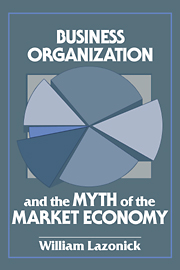Book contents
- Frontmatter
- Contents
- List of figures
- Acknowledgments
- Introduction: the wealth of three nations
- PART I Economic institutions and economic performance
- PART II Intellectual foundations and intellectual constraints
- PART III The “marvels of the market” versus the “visible hand”
- PART IV Overcoming intellectual constraints
- 8 Business organization and economic theory
- 9 Rigor and relevance in economics
- Index
9 - Rigor and relevance in economics
Published online by Cambridge University Press: 01 April 2010
- Frontmatter
- Contents
- List of figures
- Acknowledgments
- Introduction: the wealth of three nations
- PART I Economic institutions and economic performance
- PART II Intellectual foundations and intellectual constraints
- PART III The “marvels of the market” versus the “visible hand”
- PART IV Overcoming intellectual constraints
- 8 Business organization and economic theory
- 9 Rigor and relevance in economics
- Index
Summary
Historical analysis as rigorous economics
To produce a theory of capitalist development that can account for the major changes in international industrial leadership of the past century, we can begin with the insights of the likes of Marx, Schumpeter, and Marshall. Then, using theory as a guide to empirical research rather than as a reason for ignoring it, we can generate the data that will enable us to confirm, modify, or reject our previously held assumptions and explanations. Model building is important for working out the internal logic of a chosen set of assumptions and relationships. But rigorous empirical analysis is needed to ensure the relevance of those assumptions and relationships.
Such a methodology that integrates the building of theory and the study of reality contrasts with the highly abstract mathematical models that fill the mainstream economic journals and sell themselves as “economic science.” The ability of economists to use mathematical technique has far outrun their understanding of economic reality. Indeed, the extent to which modern economists rely on mathematical technique to establish their professional credentials generally constitutes an intellectual impediment – what one might call a “trained incapacity” – to comprehending the economy as a dynamic, historical process.
The intellectual problem is not mathematical virtuosity per se; I have personally worked with accomplished mathematical economists who were adept at comprehending, and even fashioning, dynamic historical arguments. The problem is with the construction of intricate and esoteric models of economic activity that are relevant to the world of economists but irrelevant to the world of economics.
- Type
- Chapter
- Information
- Business Organization and the Myth of the Market Economy , pp. 303 - 350Publisher: Cambridge University PressPrint publication year: 1992



